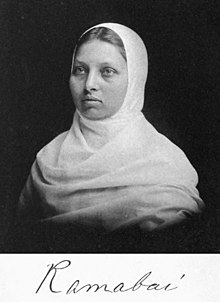Pandita Ramabai | |
|---|---|
 | |
| Born | Rama Dongre 23 April 1858 Mangalore, Madras Presidency, British India |
| Died | 5 April 1922 (aged 63) Kedgaon, Bombay Presidency, British India |
| Occupation | Social reformer |
| Years active | 1885–1922 |
| Organization(s) | Pandita Ramabai Mukti Mission, Kedgaon |
| Known for | Ministry among destitute and orphan girls |
| Notable work | The High Caste Hindu Woman (1887)[1] |
| Spouse |
Bipin Behari Medhvi
(m. 1880; died 1882) |
| Children | 1 |
Pandita Ramabai Sarasvati (23 April 1858 – 5 April 1922) was an Indian social reformer and Christian missionary. She was the first woman to be awarded the titles of Pandita as a Sanskrit scholar and Sarasvati after being examined by the faculty of the University of Calcutta.[2] She was one of the ten women delegates of the Congress session of 1889.[3][4] During her stay in England in early 1880s she converted to Christianity. After that she toured extensively in the United States to collect funds for destitute Indian women. With the funds raised she started Sharada Sadan for child widows. In the late 1890s, she founded Mukti Mission, a Christian charity at Kedgaon village, forty miles east of the city of Pune.[5][6] The mission was later named Pandita Ramabai Mukti Mission.
- ^ Khan, Aisha (14 November 2018). "Overlooked No More: Pandita Ramabai, Indian Scholar, Feminist and Educator". The New York Times. Retrieved 14 October 2024.
- ^ "Women's History Month: Pandita Ramabai". Women's History Network. 11 March 2011.
- ^ Kollanoor, Greger. "Indian Christianity and National Movements".
{{cite journal}}: Cite journal requires|journal=(help) - ^ "Short Biography of Ramabai". 25 May 2015. Archived from the original on 7 December 2018. Retrieved 23 October 2016.
- ^ Ramabai Sarasvati (Pandita); Pandita Ramabai (2003). Pandita Ramabai's American Encounter: The Peoples of the United States (1889). Indiana University Press. pp. 29–30. ISBN 0-253-21571-4.
- ^ Anne Feldhaus (29 January 1998). Images of Women in Maharashtrian Society. SUNY Press. p. 205. ISBN 978-0-7914-3660-8.